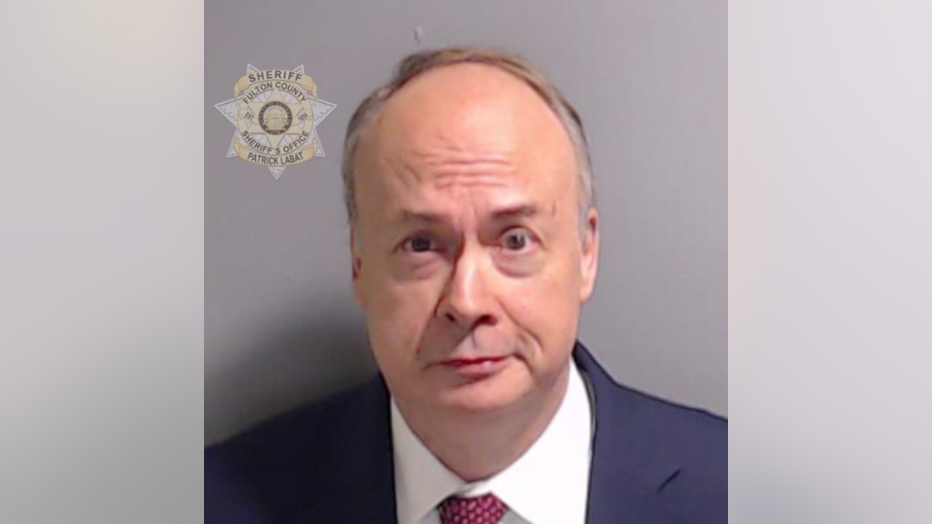Ex-DOJ official Jeffrey Clark acted within scope of official duties in Georgia case, his lawyer says

Jeffery Clark asks judge to move case to federal court
A federal judge will decide whether a former Department of Justice official can move his state charges to federal court. Jeffrey Clark is one of 19 defendants charged with trying to interfere with Georgia’s 2020 presidential election.
ATLANTA - Former Justice Department official Jeffrey Clark was acting within the scope of his official duties when he helped then-President Donald Trump try to overturn his 2020 election loss in Georgia, Clark’s lawyer said Monday as he sought to move his criminal case to federal court.
Lawyer Harry MacDougald made the arguments before U.S. District Judge Steve Jones, who rejected a similar effort from Trump White House chief of staff Mark Meadows to move his case from state court earlier this month. Unlike Meadows, Clark was not present at his own hearing and did not testify on the witness stand.
Clark and Meadows, along with Trump and 16 others, have been charged in Fulton County with participating in a wide-ranging scheme to overturn Democrat Joe Biden’s presidential election victory and keep the Republican Trump in power. All 19 defendants have pleaded not guilty.

Jeffrey Clark (Fulton County Sheriff's Office)
The indictment says Clark wrote a letter after the November 2020 election that said the Department of Justice had "identified significant concerns that may have impacted the outcome of the election in multiple States, including the State of Georgia" and asked top department officials to sign it and send it to Georgia Gov. Brian Kemp and state legislative leaders. Clark knew at the time that the statement was false, the indictment alleges.
According to the indictment, Clark was told by top department officials that the central claim in his letter was false, that he didn’t have the authority to make that claim and that it was outside the department’s role, prosecutors wrote in their response.
MacDougald, addressing the officials’ reaction to Clark’s letter, characterized their objection as a disagreement among lawyers. Losing an argument, MacDougald argued, doesn’t mean a criminal act was taken.
"What I’m saying is, lawyers can disagree about that without being put in prison," MacDougald said on Monday.
Jones asked MacDougald if someone who was holding the two roles that Clark had at the time — assistant attorney general overseeing the environment and natural resources division and acting assistant attorney general over the civil division — had the authority to go straight to the president without first going through the Department of Justice.
OTHER RECENT STORIES
California lawmakers ask AG to exclude Trump from Republican primary ballot
900 prospective jurors to be called for first trial in Georgia election interference case
On 'Meet the Press,' Trump refuses to say whether he watched Jan. 6 attack unfold on television
If he’s contacted by the president, MacDougald responded, then yes.
Prosecutors have argued that Clark’s two roles gave him no authority over elections or criminal investigations.
MacDougald noted that the Department of Justice was already looking into election fraud allegations before Clark got involved.
"The Rubicon had already been crossed," MacDougald said.
Clark is one of five defendants seeking to move his case to federal court. Although the ruling against Meadows could signal an uphill battle for Clark and the others, Jones made clear he would assess each case individually.
It was unclear when Jones would rule. He issued his decision in the Meadows case a week and a half after the hearing.
The practical effects of moving to federal court would be a jury pool that includes a broader area than just overwhelmingly Democratic Fulton County and a trial that would not be photographed or televised, as cameras are not allowed inside federal courtrooms. But it would not open the door for Trump, if he’s elected again in 2024, or another president to issue pardons because any conviction would still happen under state law.
The law allowing federal officers to move a case to federal court "is designed to protect legitimate federal authority from state and local interference, not to afford a federal forum to individuals who blatantly sought to misuse the weight of federal authority to interfere with matters of state control," prosecutors wrote in a filing before Clark’s hearing.
Meadows, who is appealing Jones’ ruling, took the stand and testified for nearly four hours last month, answering questions from his own lawyer, a prosecutor and the judge. He talked about his duties as Trump’s last chief of staff and sometimes struggled to recall the details of the two months following the November 2020 election.
Clark was identified as one of six unnamed co-conspirators in an indictment filed by special counsel Jack Smith charging Trump with seeking to illegally overturn the results of the 2020 election and block the peaceful transfer of power to Biden. He has not been charged in that case.
Federal agents searched Clark’s Virginia home in the summer of 2022, and video emerged of him standing in his driveway, handcuffed and wearing no pants.

